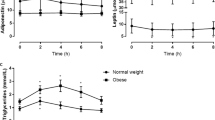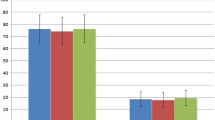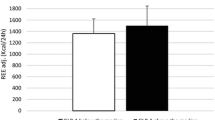Abstract
The role of resistin in humans is controversial although resistin has been linked to atherosclerotic and inflammatory processes. In rodents, resistin expression is suppressed after food restriction while central administration of resistin promotes short-term satiety. However, the nature of postprandial responses in circulating resistin in humans is unknown. Therefore, we investigated postprandial resistin concentrations in a pilot study in 19 healthy subjects and 19 controls matched for age and body mass index (BMI). Serum resistin, insulin and non-esterified fatty acids (NEFA) concentrations as well as plasma glucose and triglycerides were repeatedly assessed before and after ingestion of an isocaloric standardized liquid meal during a 300 min period. After consumption of liquid meal, serum resistin levels increased compared to fasting control (p=0.037). Postprandial plasma glucose and serum insulin increased (p<0.001) with lower glucose responses in females (p=0.001) and lower insulin responses in males (p=0.012). Plasma triglycerides increased and serum NEFA decreased with similar gender responses (p=0.025 and p<0.001, respectively). Serum resistin was not correlated to glucose, insulin, triglyceride, and NEFA responses to liquid meal challenge tests. The present data suggest that serum resistin increases postprandially in healthy humans. Additional studies are needed to elucidate normal 24-h daytime profiles in humans and differential response of serum resistin to macronutrient composition of meals.
Similar content being viewed by others
References
Steppan CM, Bailey ST, Bhat S, et al. The hormone resistin links obesity to diabetes. Nature 2001, 409: 307–12.
Barb D, Wadhwa SG, Kratzsch J, et al. Circulating resistin levels are not associated with fat redistribution, insulin resistance, or metabolic profile in patients with the highly active antiretroviral therapy-induced metabolic syndrome. J Clin Endocrinol Metab 2005, 90: 5324–8.
Lee JH, Chan JL, Yiannakouris N, et al. Circulating resistin levels are not associated with obesity or insulin resistance in humans and are not regulated by fasting or leptin administration: cross-sectional and interventional studies in normal, insulin-resistant, and diabetic subjects. J Clin Endocrinol Metab 2003, 88: 4848–56.
Nagaev I, Smith U. Insulin resistance and type 2 diabetes are not related to resistin expression in human fat cells or skeletal muscle. Biochem Biophys Res Commun 2001, 285: 561–4.
Haluzik M, Haluzikova D. The role of resistin in obesity-induced insulin resistance. Curr Opin Investig Drugs 2006, 7: 306–11.
Arner P. Resistin: yet another adipokine tells us that men are not mice. Diabetologia 2005, 48: 2203–5.
Kusminski CM, McTernan PG, Kumar S. Role of resistin in obesity, insulin resistance and Type II diabetes. Clin Sci (Lond) 2005, 109: 243–56.
Ort T, Arjona AA, MacDougall JR, et al. Recombinant human FIZZ3/resistin stimulates lipolysis in cultured human adipocytes, mouse adipose explants, and normal mice. Endocrinology 2005, 146: 2200–9.
Koebnick C, Wagner K, Garcia AL, et al. Increase in serum resistin during weight loss in overweight subjects is related to lipid metabolism. Int J Obes (Lond) 2006, 30: 1097–103.
Adeghate E. An update on the biology and physiology of resistin. Cell Mol Life Sci 2004, 61: 2485–96.
Delhanty PJ, Mesotten D, McDougall F, Baxter RC. Growth hormone rapidly induces resistin gene expression in white adipose tissue of spontaneous dwarf (SDR) rats. Endocrinology 2002, 143: 2445–8.
Asakawa A, Inui A, Kaga T, et al. Antagonism of ghrelin receptor reduces food intake and body weight gain in mice. Gut 2003, 52: 947–52.
Nogueiras R, Gualillo O, Caminos JE, Casanueva FF, Dieguez C. Regulation of resistin by gonadal, thyroid hormone, and nutritional status. Obes Res 2003, 11: 408–14.
Nogueiras R, Barreiro ML, Caminos JE, et al. Novel expression of resistin in rat testis: functional role and regulation by nutritional status and hormonal factors. J Cell Sci 2004, 117: 3247–57.
Tovar S, Nogueiras R, Tung LY, et al. Central administration of resistin promotes short-term satiety in rats. Eur J Endocrinol 2005, 153: R1–5.
Patel L, Buckels AC, Kinghorn IJ, et al. Resistin is expressed in human macrophages and directly regulated by PPAR gamma activators. Biochem Biophys Res Commun 2003, 300: 472–6.
Polson DA, Thompson MP. Macronutrient composition of the diet differentially affects leptin and adiponutrin mRNA expression in response to meal feeding. J Nutr Biochem 2004, 15: 242–6.
Lehrke M, Reilly MP, Millington SC, Iqbal N, Rader DJ, Lazar MA. An inflammatory cascade leading to hyperresistinemia in humans. PLoS Med 2004, 1: e45.
Silswal N, Singh AK, Aruna B, Mukhopadhyay S, Ghosh S, Ehtesham NZ. Human resistin stimulates the pro-inflammatory cytokines TNF-alpha and IL-12 in macrophages by NF-kappaB - dependent pathway. Biochem Biophys Res Commun 2005, 334: 1092–101.
Williams MJ, Sutherland WH, McCormick MP, de Jong SA, Walker RJ, Wilkins GT. Impaired endothelial function following a meal rich in used cooking fat. J Am Coll Cardiol 1999, 33: 1050–5.
Plotnick GD, Corretti MC, Vogel RA. Effect of antioxidant vitamins on the transient impairment of endothelium-dependent brachial artery vasoactivity following a single high-fat meal. JAMA 1997, 278: 1682–6.
Author information
Authors and Affiliations
Corresponding author
Rights and permissions
About this article
Cite this article
Gruendel, S., Weickert, M.O., Garcia, A.L. et al. Serum resistin increases in a postprandial state during liquid meal challenge test in healthy human subjects. J Endocrinol Invest 29, RC27–RC30 (2006). https://doi.org/10.1007/BF03349186
Accepted:
Published:
Issue Date:
DOI: https://doi.org/10.1007/BF03349186




